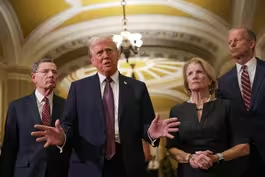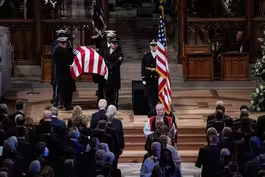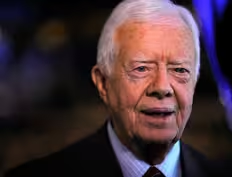
A look at Southern California's fire response and resources
Clip: 1/9/2025 | 5m 38sVideo has Closed Captions
A look at Southern California's wildfire response and resources
Many questions are being asked about the response to the deadly wildfires in the Los Angeles area. Amna Nawaz discussed some of those concerns with Juliette Kayyem, a former assistant secretary at the Department of Homeland Security and faculty chair of the Homeland Security program at Harvard’s Kennedy School.
Problems playing video? | Closed Captioning Feedback
Problems playing video? | Closed Captioning Feedback
Major corporate funding for the PBS News Hour is provided by BDO, BNSF, Consumer Cellular, American Cruise Lines, and Raymond James. Funding for the PBS NewsHour Weekend is provided by...

A look at Southern California's fire response and resources
Clip: 1/9/2025 | 5m 38sVideo has Closed Captions
Many questions are being asked about the response to the deadly wildfires in the Los Angeles area. Amna Nawaz discussed some of those concerns with Juliette Kayyem, a former assistant secretary at the Department of Homeland Security and faculty chair of the Homeland Security program at Harvard’s Kennedy School.
Problems playing video? | Closed Captioning Feedback
How to Watch PBS News Hour
PBS News Hour is available to stream on pbs.org and the free PBS App, available on iPhone, Apple TV, Android TV, Android smartphones, Amazon Fire TV, Amazon Fire Tablet, Roku, Samsung Smart TV, and Vizio.
Providing Support for PBS.org
Learn Moreabout PBS online sponsorshipAMNA NAWAZ: Well, a number of questions remain about the response to these deadly wildfires.
Let's look at some of those now with Juliette Kayyem, a former assistant secretary at the Department of Homeland Security, now at the Harvard Kennedy School.
Juliette, let's talk about some of the conversation and questions around water usage first.
You heard Stephanie Sy reporting there about these moments when hydrants were going dry just as firefighters were trying to use them to fight the flames.
What do we know about the municipal water system, about the role it's meant to play in these efforts, and what happened here?
JULIETTE KAYYEM, Former U.S. Department of Homeland Security Assistant Secretary: So we know -- what we know is that no city is built for a municipal water system to deliver assistance during what's essentially a wildland fire.
This is the challenge that Los Angeles is facing now.
You have a WUI.
It's called wildland-urban interface.
The best way to fight a wildland fire is by using helicopters and dropping water on it.
We don't have that capacity now because of the winds and because you're in populated areas.
So they're essentially doing hand-to-hand combat.
The sort of metropolitan municipal water system is not built for that kind of capacity.
So, basically, what happened is, there's enough water.
This has nothing to do with the supply of water.
It has to do with the pressure in the system.
Everyone was grabbing it at the same time.
So it's not able to refill.
And that is why you heard about, well, there was no water in the hydrants.
Actually, there was water.
There wasn't enough pressure to deliver that water to hilly areas like the Pacific Palisades, which is essentially sort of a cliff area over the ocean.
It's been remedied, but that happened also in Maui.
It's happened in other major fires.
These systems are not built for wildland fires.
AMNA NAWAZ: In another kind of response here, we saw president-elect Trump point blame directly at the California governor, Gavin Newsom, falsely claiming that Newsom had failed to sign a water restoration declaration.
You tweeted about that, saying this.
You said: "In all my years in and studying disaster management, I have never seen a president-elect blame a jurisdiction while the disaster was still out of control.
It distracts, is cruel to first responders and victims, and could impede effective response."
What did you mean by that?
How could it impede the response?
JULIETTE KAYYEM: Because this is the president-elect.
Half the nation voted for him.
They are going to believe what he says.
In the moments that we're in, there will be time for blame.
There will be time for assessment.
There will be time for legal challenges, as well as hopefully building changes.
Right now, you're just trying to protect life and protect the life of firefighters.
One way you protect life is, people listen to their local authorities.
That is, do they evacuate or do they not evacuate?
Do they stay put?
Where should they go?
All the things that, all the complaints that you're hearing now, to the extent that you don't want to put a population at war with its local jurisdiction, as Donald Trump did by his implication that this is someone's fault, someone's direct fault, is dangerous.
And I -- look, there are -- this fire didn't just happen this week.
This has been decades, centuries of building Los Angeles as it was built, with no requirements on homeowners about how they build, no capacity to deal with major fires if you did not have helicopter capacity.
We are seeing a century of public policy not adapting to climate change.
It's not a single governor's fault or a single mayor's fault, no matter how much you might want to nitpick particular things.
And Cal Fire, there's no fire department more able to deal with a wildland urban fire like we're dealing with now, and they are overwhelmed.
So it's not really about their own capacity either.
AMNA NAWAZ: Juliette, there was also this question about potential budget cuts.
We know the L.A. fire chief seemed to warn last month that a decision to cut or trim part of her department's budget could affect fire prevention plans.
What do you make of that and could that have an impact here?
JULIETTE KAYYEM: It could in the future.
And I think the mayor is right to say that she's going to readdress the budget.
That narrative also was used for political purposes, people who might run against the mayor.
Basically, the budget as it now is, is $50 million higher than it was last year.
That's just the facts of the case.
The issue that is being questioned is future budget, in particular in relation to union negotiations.
So, if you just sort of drop in and want to look at a budget sheet, it might suggest that the fire department is worse off in the future.
That's just simply because they're in budget negotiations.
Anyone who's dealt with government budgets knows how this works.
But, right now, the capacity was not impacted by any budget changes.
If you're looking for blame, the blame is the wind.
I have to be honest with you.
It is pushing embers from house to house, so there's no way to stop this fire.
And it is not -- it is causing -- or it is stopping the ability to use the one tool that is going to put these fires under control, which is being able to water-drop from helicopters.
That is going to start now, has started a little bit now.
But that is the horror that this is, that the wind is just basically working against everyone in Los Angeles right now.
AMNA NAWAZ: Juliette Kayyem, formerly of the Department of Homeland Security, now with the Harvard Kennedy School.
Juliette, thank you.
Almost good to speak with you.
JULIETTE KAYYEM: Thank you.
Critics say not enough U.S. aid is reaching African farmers
Video has Closed Captions
Clip: 1/9/2025 | 11m 23s | U.S. aid leaves out local groups addressing food security in Africa, critics say (11m 23s)
GOP lawmakers take early steps to implement Trump's agenda
Video has Closed Captions
Clip: 1/9/2025 | 4m 25s | GOP lawmakers take early steps to implement Trump's agenda (4m 25s)
How Carter's life of service and humanitarianism will be recognized
Video has Closed Captions
Clip: 1/9/2025 | 9m 44s | How Carter's life of public service and humanitarianism will be recognized (9m 44s)
Jimmy Carter remembered and honored at state funeral in Washington
Video has Closed Captions
Clip: 1/9/2025 | 5m 37s | Jimmy Carter remembered and honored during state funeral in Washington (5m 37s)
LA faces apocalyptic devastation as wildfires still burn
Video has Closed Captions
Clip: 1/9/2025 | 9m 32s | Los Angeles begins to face 'apocalyptic' devastation as wildfires continue to burn (9m 32s)
Providing Support for PBS.org
Learn Moreabout PBS online sponsorship
- News and Public Affairs

FRONTLINE is investigative journalism that questions, explains and changes our world.

- News and Public Affairs

Amanpour and Company features conversations with leaders and decision makers.












Support for PBS provided by:
Major corporate funding for the PBS News Hour is provided by BDO, BNSF, Consumer Cellular, American Cruise Lines, and Raymond James. Funding for the PBS NewsHour Weekend is provided by...




